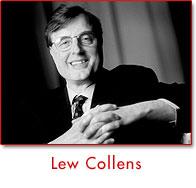|
| Biography |
| |
 Lewis Collens has served as president of Illinois Institute of Technology since 1990.
Lewis Collens has served as president of Illinois Institute of Technology since 1990.
He holds degrees in accounting (B.S., U. of Illinois), philosophy (M.A., U. of Illinois) and Law (J.D., U. of Chicago). He joined IIT’s Chicago-Kent College of law as Professor of Law in 1970 (teaching corporate and securities law), and was serving as a Law and Humanities Fellow at Harvard Law School when he was named Dean of Chicago-Kent in 1974.
Before joining Chicago-Kent he practiced law in Chicago and Washington, D.C., was Controller of Robeson’s department store in Champaign, Ill., and was Co-founder and Chairman of BAR/BRI Educational Publishing Co.
He currently serves as a director of Dean Foods Company, AMSTED Industries, Alion Science and Technology Corp. and The Colson Group, Inc.
He has been very active in civic and professional activities, including service as a member of the Advisory Committee of The Partnership for New Communities; President, Leadership Greater Chicago; Director, The Economic Club of Chicago; Chairman, Association of Independent Technological Universities; Director, National Association of Independent Colleges and Universities; Trustee, The Latin School of Chicago, and a member of the Mayors Council of Technology Advisors.
He is a life long Chicagoan where he lives with his wife Marge. They have one son, Steven.
|
| |
|
|
| |
| Abstract |
| |
|
The role of biotechnology research parks in economic development, technology transfer, and public health |
|
|
|
The role of biotechnology research parks in economic development, technology transfer, and public health
University and government affiliated research parks are an established mechanism to grow new ventures and promote economic development. The majority of the world’s university and government-affiliated research parks identify biotechnology as the primary focus of their efforts. This presentation examines the experience gained in the 40-year history of biotechnology research parks in the developed world. Beginning with an overview of the economic benefits derived from university based research parks, I will discuss the economic, legal and regulatory conditions necessary for the effective transfer of technology from the university to the commercial world. This will include a review of strategies undertaken by governments to reform intellectual property law; promote anti-trust activity that fosters collaborative research; and advance regulatory frameworks that accelerate the process of bringing new products to market. Finally, I will compare issues surrounding research imperatives, technology transfer, and public health in mature collaborative environments such as North America, Europe, and Asia and their relationship to the evolving situation in South America, the Middle East, and Africa. |
|
| |
|